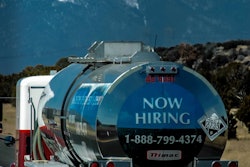 The report, published by BLS, contends that though fleets struggle with driver retention, there’s little evidence of a shortage of those willing to drive a truck, pushing back against what it calls the “industry’s own account” that there’s a labor shortage in the long-haul trucking segment.
The report, published by BLS, contends that though fleets struggle with driver retention, there’s little evidence of a shortage of those willing to drive a truck, pushing back against what it calls the “industry’s own account” that there’s a labor shortage in the long-haul trucking segment.A lengthy study recently published by the federal Bureau of Labor Statistics concludes that, from a true economics perspective, there’s little evidence supporting the widely publicized notion that there’s a driver shortage in the trucking industry. Any perceived shortage is isolated to long-haul truckload fleets, argues the study from BLS, the U.S. Department of Labor’s research wing.
The issue, the authors contend, is more one of driver retention rather than a shortfall of people willing to work as truck drivers. The research acknowledges the market for drivers has been tight for decades, but says that there’s no “evidence of a secular shortage,” referring to a shortage persisting long-term as opposed to temporary or cyclical.
“As a whole, the market for truck drivers appears to work as well as any other blue-collar labor market, and while it tends to be ‘tight,’ it imposes no constraints on entry into (or exit from) the occupation. There is thus no reason to think that, given sufficient time, driver supply should fail to respond to price (wage) signals in the standard way,” authors summarize in the report, Is the U.S. labor market for truck drivers broken?
The report was written by Stephen Burks, an economics professor at the University of Minnesota Morris, and Kristen Monaco, an associate commissioner at BLS.

The authors contend that labor shortages are difficult for economists to pin down and to study, but the agency casts blame for persistent claims of a driver shortage on the media — both consumer and trucking trade press — and with trade associations, notably the American Trucking Associations. ATA has long argued the industry faces a pressing shortage of truck drivers. ATA Chief Economist Bob Costello, in a response issued to the BLS report, said the report’s authors presented a misunderstanding of the driver shortage perception.
Overdrive has been something of an outlier among consumer and trucking trade press, casting doubt on the “driver shortage” notion most prominently in the 2016 “Driver Shortage Alarm” feature series.
The Owner-Operator Independent Drivers Association, too, last month issued a report arguing the driver shortage is more myth than reality. OOIDA argues that growth in the number of small fleets and growth of small fleets themselves has prompted greater competition for drivers, thus exacerbating larger fleets’ troubles with recruiting and retaining drivers.
Costello says the BLS report disregards ATA’s arguments that the driver deficit is about a dearth of “qualified drivers,” not a shortage of applicants.
“There are many barriers to entry for new drivers: age requirements, CDL testing standards, strict drug and alcohol testing regimes and, perhaps most importantly for many fleets, safe and clean driving records,” he says. “In some cases, carriers must reject 90 percent of applicants of out of hand because they fail to meet at least one of the prerequisites to drive in interstate commerce.”
High turnover, though often mentioned as contributing to the driver shortage, does not equate to a labor shortage, the BLS report contends. Accounting for all industry segments, there’s little evidence of a labor shortage relative to driving jobs, says the study.
From the report: “Economists would not regard high turnover rates and the associated problems of recruiting and retaining drivers in this part of trucking as a long-term shortage. Nor would they call these conditions a ‘broken market,’ except to the extent that one might use that term for a secondary labor market segment, since the high turnover that marks such a segment is an indicator that the jobs in it are unattractive to many potential employees.”
As drivers have long argued, the authors also assert that higher driver pay could help alleviate fleets’ recruiting and retention woes. “Higher earnings in truck driving increase occupational entry, especially among individuals who are willing to work longer hours for higher weekly income,” the report states.
Costello said “the authors’ own concession that wages are going up significantly, as motor carriers are unable to hire quality drivers, undercuts their own conclusions. This alone suggests there is a systemic issue with getting enough labor in the for-hire truckload driver market.”
The study covers industry data from between 2003 and 2017, including data on industry wages, turnover, trucking segments and more. Those metrics were compared to data within other industries with which trucking competes for workers, such as construction and manufacturing.
Truckers earn more than workers in those industries, helping lead to stable employment within trucking, the report finds. Drivers are likely to move between industries for better money, but surprisingly, truckers move between occupations at a lower rate than “workers with similar education levels,” the report’s authors say. “This suggests that, in aggregate, the labor market for truck drivers works about as well as the labor markets for other blue-collar occupations.”










